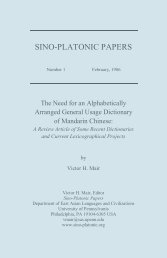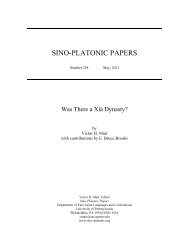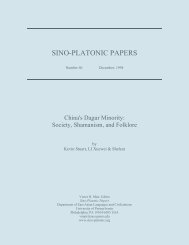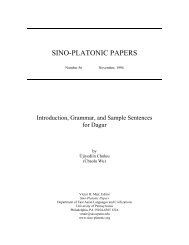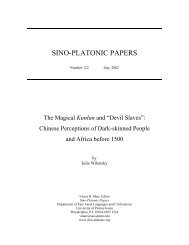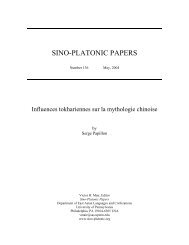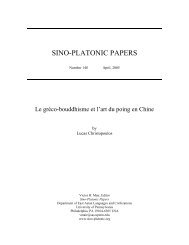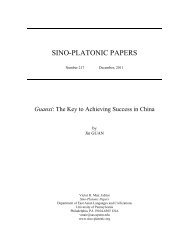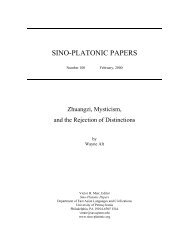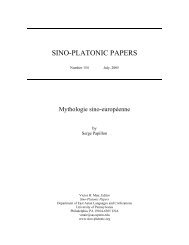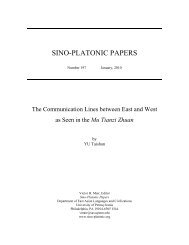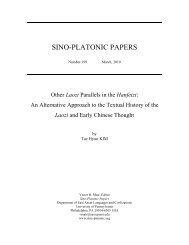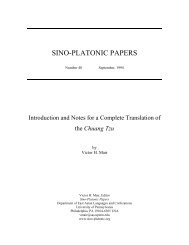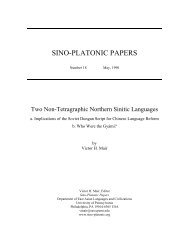Slips of the Tongue and Pen in Chinese - Sino-Platonic Papers
Slips of the Tongue and Pen in Chinese - Sino-Platonic Papers
Slips of the Tongue and Pen in Chinese - Sino-Platonic Papers
You also want an ePaper? Increase the reach of your titles
YUMPU automatically turns print PDFs into web optimized ePapers that Google loves.
David Moser, "<strong>Slips</strong> <strong>of</strong> <strong>the</strong> <strong>Tongue</strong> <strong>and</strong> <strong>Pen</strong> <strong>in</strong> Ch<strong>in</strong>ese"<br />
S<strong>in</strong>o-<strong>Platonic</strong> <strong>Papers</strong>, no. 22 (March 199 1)<br />
Ex. 21. "If you th<strong>in</strong>k that while you're pregnant you can stay <strong>in</strong> tip-top<br />
*tape... tip-top shape, forget it."<br />
There seems to be general agreement that perseveration errors are<br />
less common than anticipations. Researchers such as Nooteboom (1973)<br />
<strong>and</strong> van den. Broecke & Goldste<strong>in</strong> (1980), look<strong>in</strong>g at English, German, <strong>and</strong><br />
Dutch, have noted this difference <strong>in</strong> frequency. The latter ma<strong>in</strong>ta<strong>in</strong> that<br />
anticipations are <strong>the</strong> more common because <strong>the</strong> part <strong>of</strong> <strong>the</strong> utterance still <strong>in</strong><br />
<strong>the</strong> programm<strong>in</strong>g stage is more salient than what has already been uttered.<br />
Abd-El & Abu-Salim (1987), <strong>in</strong> contrast, found <strong>the</strong> frequency <strong>of</strong><br />
anticipations <strong>and</strong> perseverations to be almost equal <strong>in</strong> <strong>the</strong>ir corpus <strong>of</strong><br />
errors <strong>in</strong> Arabic. Interest<strong>in</strong>gly, G<strong>and</strong>our (1977) found that tonal<br />
perseveration errors outnumbered tonal anticipation errors by a ratio <strong>of</strong><br />
about two to one <strong>in</strong> his collection <strong>of</strong> speech errors <strong>in</strong> Thai, <strong>and</strong> it is not clear<br />
whe<strong>the</strong>r this represents some idiosyncracy <strong>of</strong> his corpus or perhaps some<br />
aspect <strong>of</strong> tone itself. G<strong>and</strong>our notes that <strong>in</strong> <strong>the</strong> tone languages <strong>of</strong> West<br />
Africa, perseverative tone rules (rules that spread tones from left to right)<br />
are more common than anticipatory tone rules (rules that spread tones<br />
from right to left), <strong>and</strong> he speculates that this asymmetry might suggest<br />
some built-<strong>in</strong> constra<strong>in</strong>t <strong>in</strong> <strong>the</strong> speech mechanism which would also expla<strong>in</strong><br />
<strong>the</strong> preponderance <strong>of</strong> tonal perseveration errors. I have been able to<br />
collect very few perseveration errors, tonal or o<strong>the</strong>rwise, <strong>in</strong> Ch<strong>in</strong>ese, but<br />
this may merely reflect <strong>the</strong> modest size <strong>of</strong> my collection, or perhaps some<br />
<strong>in</strong>tr<strong>in</strong>sic difficulty <strong>in</strong> collect<strong>in</strong>g such errors.<br />
At any rate, <strong>the</strong> follow<strong>in</strong>g examples culled from my small collection <strong>of</strong><br />
perseverations highlight many <strong>of</strong> <strong>the</strong> same issues raised by anticipation<br />
errors:<br />
EX. 22. "$& - + jhc gan ... 7 ~ . . . 9 9<br />
"T3 shi yige cTIn*gZn ... g'anb 'u..." ("She's a cadre from <strong>the</strong> countryside...")<br />
Presumably <strong>the</strong> first tone <strong>of</strong> "tun" (H) was persevered <strong>in</strong> <strong>the</strong> syllable "g<strong>in</strong>'<br />
( Note, however, that <strong>the</strong> character also has a first-tone read<strong>in</strong>g as<br />
well (g3n). Though <strong>the</strong> error was uttered <strong>in</strong> spontaneous conversation, not<br />
while read<strong>in</strong>g a text, it is hard to say what k<strong>in</strong>d <strong>of</strong> a contribut<strong>in</strong>g <strong>in</strong>fluence<br />
such factors may have.<br />
Ex. 23. "2 # fR @ fl # dl"aomV<br />
"~h\ei jtan shi hgn n6n yblho *di\ao." ("This was very hard to predict.")



